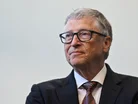
Bill Gates
A Prolific Tech Leader and Philanthropist, Gates is Best Known as the Co-Founder of Microsoft, one of the World’s Largest Technology Companies
One of the most influential figures of the 20th and 21st centuries, Bill Gates is a technologist, business leader and world-renowned philanthropist. He is best known as the co-founder of Microsoft, one of the world’s largest and most influential technology companies.
Gates developed a passion for computers from an early age, developing his first software program at the age of 13. In high school he helped form a group of programmers who computerised their school’s payroll system and founded Traf-O-Data, a company that sold traffic-counting systems to local governments.
In 1973, he enrolled at Harvard University, but his stay was short-lived. In 1975, Gates left Harvard to pursue his passion for software development with his childhood friend, Paul Allen. Together, they founded Microsoft, a company that would go on to dominate the software industry for decades.
Microsoft, under Gates’ leadership, became the dominant player in the personal computer industry with its MS-DOS operating system and subsequently, its flagship operating system, Windows, first launched in 1985. Windows would become the standard for personal computers worldwide, with the company becoming the world’s largest personal computer software company.
However, Gates’ tenure at Microsoft was not without controversy. The company faced several legal challenges regarding monopolistic practices, notably a lengthy antitrust lawsuit in the late 1990s. Despite these challenges, Gates remained a pivotal figure in the tech industry, leading Microsoft until he stepped down as CEO in 2000 to focus more on philanthropy, though he remained involved as Chairman and Chief Software Architect.
Since 1987, Gates has been included in the Forbes list of the world’s billionaires. From 1995 to 2017, he held the Forbes title of the richest person in the world every year, except in 2008 and from 2010 to 2013.
In addition to his work at Microsoft, Gates is also known for his charitable work. In 2000, Gates and his wife Melinda established the Bill & Melinda Gates Foundation, which is now the world’s largest charitable foundation. The foundation has focused on combating poverty, improving global health, and expanding access to education. Gates has given away more than US$90bn through the foundation, making him one of the most generous philanthropists in history.
In June 2006, Warren Buffett announced an ongoing gift to the foundation, which would allow its assets to total roughly US$60bn in the next 20 years. At the beginning of the 21st century, the foundation continued to focus on global health and global development, as well as community and education causes in the United States.
Gates’s contributions to technology and philanthropy have been recognised with numerous awards and honours. He has received the Presidential Medal of Freedom, the National Medal of Technology and Innovation and the Japan Prize, and was named Time magazine’s Person of the Year along with his wife and Bono in 2005. He is also a member of the National Academy of Engineering and the American Philosophical Society.
Gates has also been a leading voice in addressing climate change, advocating for sustainable energy solutions and investing in green technologies.
Throughout his career, Gates has been a prolific author and speaker, sharing his insights on technology, business, and philanthropy. His books, including “The Road Ahead” (1995) and “How to Avoid a Climate Disaster” (2021), reflect his thinking on the future of technology and environmental sustainability.
Today, Gates describes himself as a ‘full-time philanthropist’, and also regularly updates a blog covering a range of topics from sustainability to the latest developments in technology, including AI.
“The development of AI is as fundamental as the creation of the microprocessor, the personal computer, the Internet and the mobile phone,” he wrote recently. “It will change the way people work, learn, travel, get health care, and communicate with each other. Entire industries will reorient around it. Businesses will distinguish themselves by how well they use it.
“The world needs to make sure that everyone – and not just people who are well-off – benefits from artificial intelligence. Governments and philanthropy will need to play a major role in ensuring that it reduces inequity and doesn’t contribute to it. This is the priority for my own work related to AI.”





